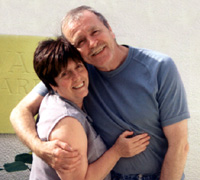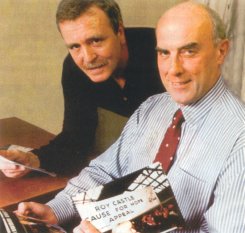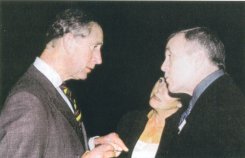Originally published in August 2003 icon
Lung Cancer - The Facts Roy Castle Lung Cancer Foundation

I Can Get well
It’s 13 years since Terry Kavanagh, 57, learned he had lung cancer and had just a 5 per cent chance of recovery.
Married with three children, the Liverpool joiner was inspired by a man in the next hospital bed who had survived the same disease 22 years earlier.
He now devotes his time to ensuring that other patients will get the best possible deal.
"I couldn’t believe that I had lung cancer at only 42. I was self-employed, doing well, and after 21 years of marriage, my wife Anne and I had just had our first holiday abroad. I’d been an amateur boxer, played rugby, run marathons and at 40 I’d finally put on armbands and learned to swim, quickly graduating to the advanced class. I’d kept an allotment for 30 years too, so the whole family always ate healthily with loads of vegetables and salad. When I asked the oncologist what had caused my cancer, he laughed. ’I should have thought that was obvious: smoking’, he said. But I’d never smoked in my life.
I have wondered if carpentry dust had something to do with it or if there was a connection with the swimming baths and chemicals, because when I came out my eyes would close up for 24 hours and I’d sneeze continually. Doctors have discounted the idea, but once, at the oncologist, I met a friend who’d developed throat cancer and felt sure he’d got it from working in the baths for three years. Some people of course, swim all their lives and never get ill, but equally some smokers never fall ill. Apparently 95 per cent of the people who get my type of cancer get it through smoking, so they reckon I got it from passive smoking. That’s likely, because everyone smoked where I grew up in Edge Hill. It was a totally smoking environment - still is to be honest - and my friends had their first cigarette at 11 years old.

I had so many blood tests that I began to call the nurses vampires

I’d say that lung cancer crept up on me unawares. Over several years I developed a rattle that I couldn’t cough up. My GP sent me for an x-ray, but nothing showed up.
Sometimes there were specks of blood when I cleaned my teeth. I put this down to my gums, though I now know it was from my lungs. If I sneezed, it smelt terrible too, which we thought was probably due to my time in the swimming baths. Looking back, I don’t think I’d felt 100 per cent for a long time, with a cough and slight breathlessness. After a second x-ray in October 1988, my GP said ’There is something there, but we put it down to ageing.’ After my surgery I felt I had a grievance with this guy for failing to refer me sooner, but he said they hadn’t been looking for a cancer. GP5 have a low index of suspicion for all cancers, because they are used to treating common ailments. 40,000 people are diagnosed with lung cancer in the UK every year, so if there are 40,000 GPs, then that’s only one to each doctor. They are just not fully aware.
Over the Christmas I developed a heavy, flu-ish cold. On New Year’s Day we went out to a local wine bar where Anne remembers me being as miserable as sin. The next morning I coughed up a great clot of blood, which really frightened me. The doctor’s surgery was closed so Anne suggested I go straight to the Royal Liverpool Hospital thinking they would ease my mind. Nothing was visible on the x-ray, but they booked me in for more tests, apparently looking for TB. I had a cat scan, MRI scans, two bronchoscopies and so many blood tests that I began to call the nurses vampires. At some point I couldn’t take any more, stuffed my belongings into a bag, signed myself out and walked home. But the hospital kept my bed open, recognising what trauma I was going through. Finally, on Friday 13th the ward doctor disclosed that I had a growth on my lung, using the word tumour though the word cancer was studiously avoided. I’d also developed pains all over, and the doctor told me boldly that if they were secondaries, I had about three months to live. His bedside manner was nonexistent.

I even lied to my own wife, telling her I had a bad heart

I walked out again that day, going straight home to decorate and put my house in order. I even lied to my own wife, telling her I had a bad heart. When the doctor phoned home, he told Anne that I had cancer, but as she didn’t know I knew, she didn’t let on to me. She thought my bottle would go if I found out. So, we lied to each other for the next fortnight until we both saw the consultant together. I didn’t tell anyone about the illness, not even my Mum who only found out what had really been wrong five years later when my fundraising efforts were reported in the local paper. Knowing what I know now, I wouldn’t hide my illness again, but I think then I felt ashamed. I was a working man, idolised by my kids as the big strong Dad. Suddenly I was ill and weak; I was going to die. When we got to see the specialist, I was wrongly told, through a mistake in the biopsy that I had aggressive small cell lung cancer, which is the worst sort to have. I was scheduled for surgery, which is quite unusual, as they normally treat this particular cancer with chemo or radiotherapy. But the irony was that I actually had adenocarcinoma, a small Iocalised tumour in one lung. If you have to have lung cancer, then this form offers the best prognosis, as the oncologist later said. Nearly 15 years later, I’m still here!
I had my surgery at Broadgreen Hospital a month after diagnosis - by which time that first ward doctor’s pessimism had been relieved by a compassionate young nurse who told me that as far as the tests showed, I had no spread and was clear everywhere else. ’At worst’ she said, ’you’ll lose a lung, but you’ll be OK’. I looked for her afterwards, wanting to thank her for the hope she gave, but never found her. Inspiration is a great thing, as I found out whilst awaiting my operation, which was held up because my notes had got lost in transit between the two hospitals.

There was talk of having to repeat all the tests, until Prof Donnelly, my surgeon hero said ’we’ll operate tomorrow. This man has been through enough.’ But while I was waiting I got talking to the guy in the next bed. He told me that he had the same thing as me 22 years before, survived to live a normal life and was back in hospital for something completely different. The moment I heard this I said to myself ’Well, that’ll be me.’ I made up my mind that I would survive because he had.
Surgery itself didn’t frighten me. But it wasn’t great waking up with a drip and two drainage tubes, plus an oxygen mask swamping my face. Despite being on morphine for the first 24 hours, I was in a lot of pain and couldn’t get comfortable.
Being in the high dependency unit was a bit like being a battery hen: they moved your bed further away from the nurse’s station every day. And actually my recovery was amazing: five days later I was back at home, in time for the kick-off.
There were some post-surgical setbacks, including aches and pains from broken ribs, a major nosebleed and tremendous sweats. It was fantastic to hear from the oncologist that I actually had a non-small cell lung cancer and having lost just half a lung needed no further treatment. But even hearing that you are physically disease-free doesn’t really mean you feel mentally free. Deep-down fear was almost worse two or three years down the line, as the gravity of what I’d had really started to sink in.
For many years I felt on a roller coaster ride emotionally, knowing The Beast that is cancer was still out there and could come and get me. You get odd pains, cough up the odd speck of blood and feel scared so it has to be checked out again in hospital. Physically the foot-long scar down my back is the worst legacy: it can smart and burn and eventually stopped me continuing in joinery because I couldn’t manage the heavy lifting.

One of the biggest problems of having cancer is financial hardship

One of the biggest problems of having cancer is financial hardship, but it’s also one of the least considered. Your life’s turned upside down, but the bills keep coming in. Anne had actually given up her job of 12 years just before I was diagnosed, so we really had to muddle through and now we just struggle by somehow. The children were all working and they were great at helping us out. A year after my operation we managed a holiday in Rhodes and I carried Anne up a mountain on my back, like a donkey because she was tired. We couldn’t believe what we’d come through to get there.
Three monthly checkups became six-monthly, then annual reviews, just in case. Suddenly, after 13 years,Professor Donnelly said that as far as they were concerned the cancer had gone. I came out of that appointment (December 2001) a bit emotional and when the nurse asked when I’d be coming back I gave her a big kiss and said ’never!’ All the lads in outpatients cheered; I got the girl at the desk to frank ’discharged’ on my appointment card, but typically, just as I was going out the door, I heard someone call my name. It was an old mate who’d just been diagnosed himself. So I went back and spent an hour with him.
I believe that with the experience I and other expatients have gained over the years we could be a major asset in helping those newly diagnosed, who are struggling to come to terms with their illness. The NHS should look at ways of involving patients like me in a more permanent role within the system.

When the nurse asked when I’d be coming back I gave her a big kiss and said never!

Whilst convalescing, I joined an art group and began painting and also took up yoga, a bit of reiki and meditation. Yoga’s helped not only with stretching and breathing, but in making me more aware of my weaknesses and strengths and what I am as a person. There’s a huge gratitude just to be here, and though I could have walked away from anything to do with cancer. I really feel there’s a cause to fight because so much more could be done for patients in terms of screening and treatment research. So I’m driven and I just can’t leave the charity work alone.
I’ve raised about 200,000 for the Roy Castle Lung Cancer Foundation, for leukaemia and children’s cancer charities through my sponsored walks and climbs with Anne. I’ve been up Snowdon 16 times.
You get a bit breathless but you just keep on going. I feel that I’m making a difference for other lung cancer patients. This energises me. I’ve also worked as a voluntary support worker in the local Macmillan cancer information centre, chaired the Liverpool Lung Cancer Patient Support Group and taken a counselling course because my name and photo is on the lung cancer Patients Network website. People ring me up when they are newly diagnosed and I’ve learned how to listen. I never build up false hopes, but just telling people my story let’s them know what is possible.
’I’ve also lobbied the House of Commons for more research and screening funding, and I’m the UK’s lung cancer representative on the Scientist/Survivor Programme run by the American Association of Cancer Research.

Last year in San Francisco I learned about angiogenesis and gene therapy advances, It’s a unique programme involving 15,000 people. I’m going again this July, to Washington and perhaps next year too. Looking out over the city from the top floor bar of the San Francisco Marriott Hotel last year I couldn’t believe I’d come this far since waking up in bed with drips and tubes hanging off me. It’s quite a medical success story, isn’t it?
But for lung cancer Anne and I certainly wouldn’t have met Prince Charles for lunch at Highgrove, where I was given a Queen’s Golden Jubilee award for charity work.
We weren’t going to go at first because we couldn’t afford it. But we did, and it was a fantastic day. The Prince was a smashing fellow; we discussed complementary medicine and Chinese herbs. He knows his stuff OK! If I could change things and go back to the way things were before I had cancer, of course I would choose to, but there is a plus side too."